Drinking sustainably: mineralized local water
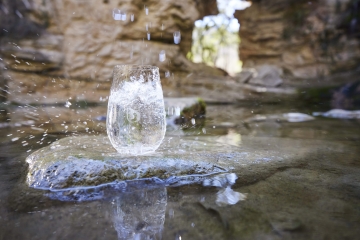
Lean back and look around you. Look at your desk, have a peek inside your fridge or in your bathroom. How much plastic can you spot? Nowadays, plastic is part of our daily lives. You can find it in every aspect of your daily routine: Your computer, fridge, thermos flask, toothbrush, shampoo - and the list goes on! Can you imagine a life without plastic? It´s not easy, right?
Nowadays, plastic is part of our daily lives. You can find it in every aspect of your daily routine: Your computer, fridge, thermos flask, toothbrush, shampoo - and the list goes on!
Can you imagine a life without plastic? It´s not easy, right? Plastic is everywhere! However, surprisingly, plastic has not always existed.
The first modern synthetic plastic, named "bakelite" after its inventor, the Belgian chemist Léo Baekeland, was not invented until 1907. In little more than a century, plastic went from being a wonderful invention and solution to many problems to becoming one of the most serious pollutants affecting us.
The word plastic comes from the Greek verb plassein, which means "to mold or shape". And it was not until the late 1950s that several improvements in manufacturing processes drastically reduced the cost of producing plastics, paving the way for cheap mass production. This brought down costs in almost all industries.
One of the main problems is that out of the 420 million tons of plastic we use every year worldwide, 86% is not recycled. Simply because there is a lack of sorting options, a lack of willingness, and - on top of that - economics favor the use of virgin plastic. But where does all this plastic end up? Mainly on landfills, eventually finding their way into rivers and oceans.
Unfortunately, the forecast is not encouraging. According to National Geographic, some 18 million tons of plastic waste flows into the oceans every year from coastal regions. In other words: One garbage truck full of plastic is dumped into the sea every single minute!
Moreover, it is estimated that by 2050 there will be more plastic than fish in our oceans (WEF, 2016).
Plastic has become a fixture in our lives. For example: The food industry uses it to wrap products in it and its part of components in almost every area. When you go to a supermarket, everything from fruits and vegetables to meats, dairy products, legumes are – you guessed it - wrapped in plastic!
One of the main problems is that out of the 420 million tons of plastic we use every year worldwide, 86% is not recycled.
We say: Enough is enough! We need to act now to transform our plastic planet back into a beautiful blue planet. We can achieve this by starting to say NO to single-use plastic. Single-use plastic packaging plays an important role in consumer products and one of its largest categories is water bottles. Did you know that 1 million plastic bottles are sold every minute worldwide? Containers full of plastic bottles are shipped across the world, thus producing unnecessary CO2 emissions.
Furthermore, one single plastic bottle can break down into ten million microplastic particles which can find their way back into our bodies. Not only is this a huge environmental issue, but also a potential health concern because of nano-plastics and substances in plastic that are hazardous to health. Today, microplastic is found in tap water, salt and beer and is present in samples collected in the world´s oceans, including the Arctic!
With state-of-the-art technology, using local mineralized drinking water, BWT offers an effective solution for people to avoid single-use plastic and glass bottles. And therefore, the unnecessary transportation and disposal of them can be drastically reduced - as well as the carbon footprint that comes with it. BWT water enhancement “inspired by nature” is tasty, locally produced drinking water, enriched by valuable minerals and trace elements such as magnesium, silicate, and zinc. Sustainability is in BWT´s DNA. That´s what motivates them to find solutions to Change the World, Sip by Sip.
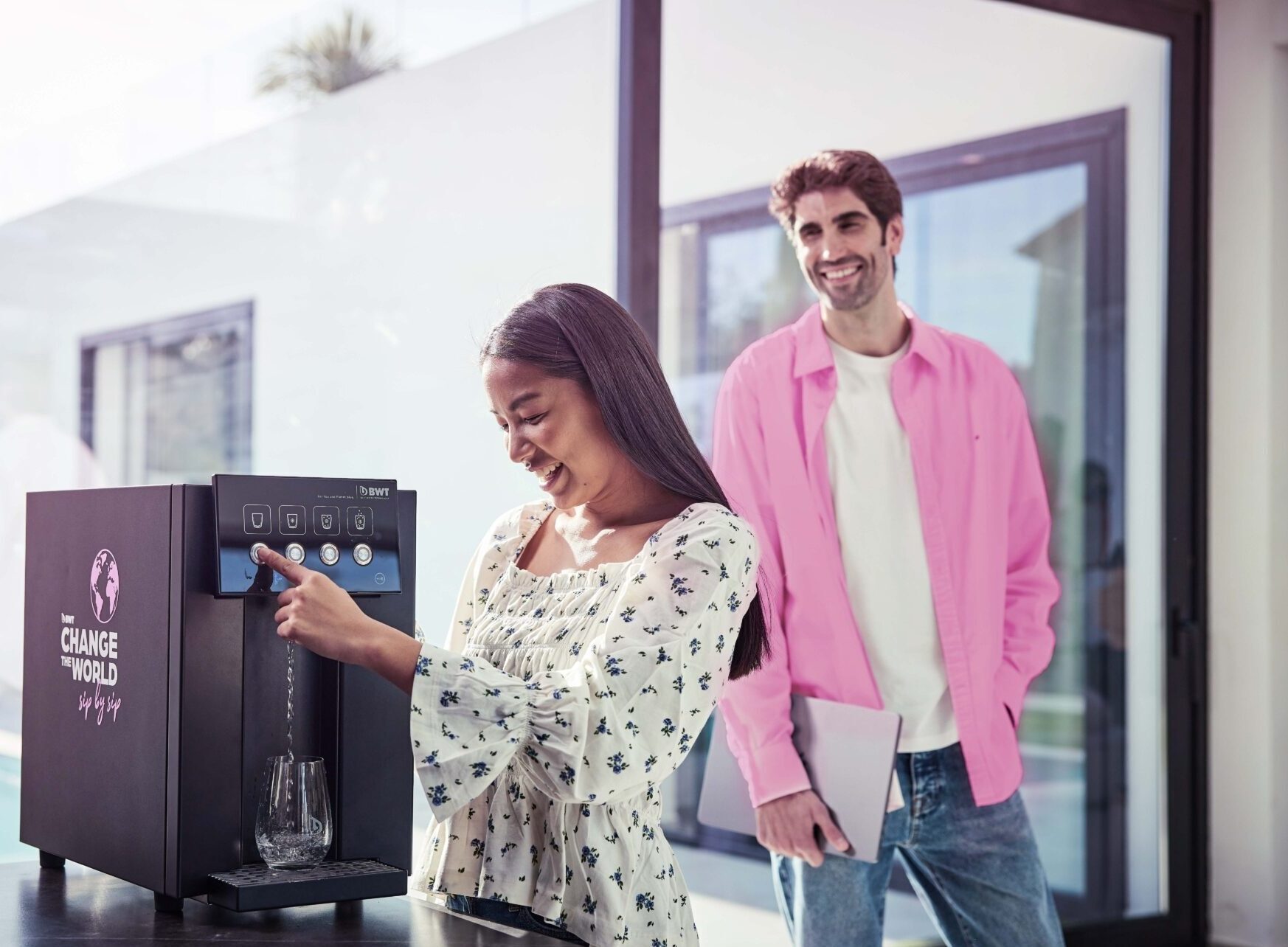
Living Tomorrow´s co-initiator and world leader in water technology, Austrian company BWT, has made it its mission to protect our most precious resource, water. As a part of doing so, they have signed an agreement to provide its technological solutions in all areas of water treatment on Living Tomorrow´s campus. The wide range of products features Climate Bottles, water dispensers and local mineralized water. We are making a statement for responsible consumption, which ensures sustainability and preservation of resources for future generations.
BWT´s goal is to inspire people all over the world and to show how easy it is for every individual to contribute to change the world. This can be achieved by simply giving up single-use plastic and glass bottles and enjoying local water directly from the tap or table water filter. It is a win-win situation for both people and the environment, and can be implemented at home, in restaurants, hotels, offices, schools and in all areas where people come together. We can make a big difference with small, simple changes, sip by sip!
THE FUTURE IS PINK!
THE FUTURE IS SUSTAINABLE!
Latest insights & stories
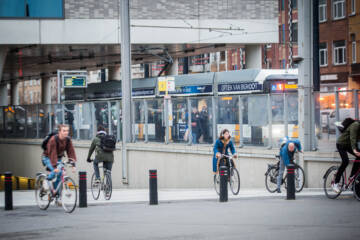
ROAD SAFETY
Since 2018, the number of traffic casualties in Flanders has risen again. Currently, the figures are stagnating, but the risk of accidents with injuries remains high for vulnerable road users in Flanders. And that while traffic should be safe for all users and modes. We want to change this by focusing on transparent policy, training on safe behavior, infrastructure improvements, legislation and enforcement.
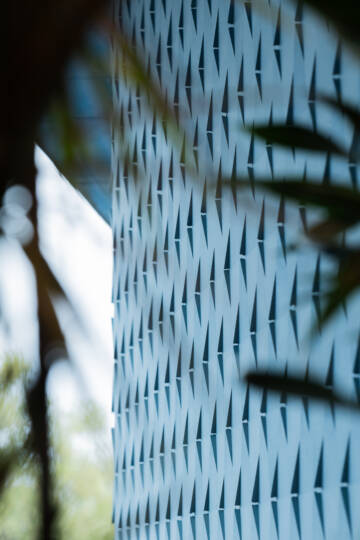
What is needed for a more circular construction sector? Insights from Sien Cornillie, Circularity expert at NAV
NAV, or "Netwerk Architecten Vlaanderen," is a professional organisation for architects in Flanders. It offers various services including professional development and advocacy for the architectural sector. NAV also fosters networking opportunities and provides advice on legal, technical, and management aspects. The network is currently working on a position paper on circularity. We sat down with Sien Cornillie, an expert on circularity and energy at NAV. This interview reflects her own opinion.
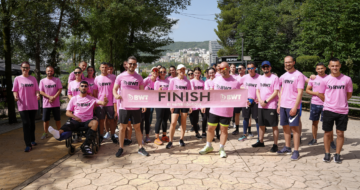
A Global Movement: The World Unites in a Pink Pledge for Clean and Sustainable Water
5,000 participants. 32 countries. €30,000 funds raised. And that's just the beginning.
Picture this: One step that sends ripples across the globe, transforming lives and creating waves of change. You might wonder, how can such a simple action for most of us have such a profound impact?